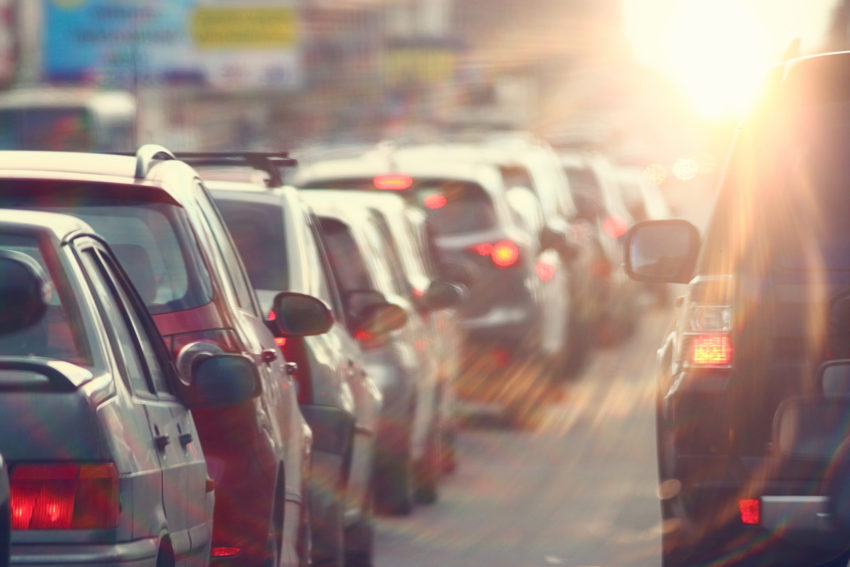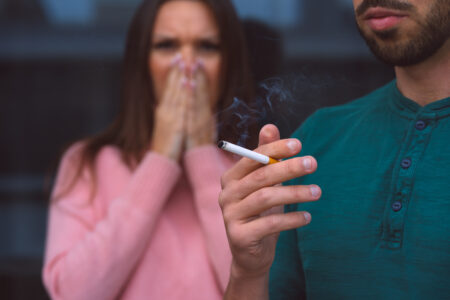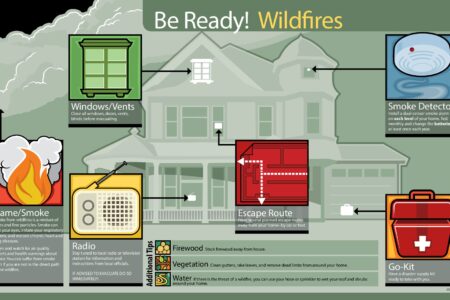
Share On Social!
Latinos and African Americans in California breathe 40% more fine particulate matter from cars, trucks and buses than their White peers, according to a new study.
This type of air particle pollution is so tiny—20 times smaller than the width of a human hair—it can penetrate deeply into the lungs and bloodstream.
It is linked to heart and lung ailments, asthma attacks, and even death.
This is bad news for Latinos, who are already disproportionately affected by air pollution in California. About 44% of Latinos live with poor air quality, compared to 25% of non-Latinos, according to a 2018 report.
“California has made enormous strides over the past several decades to reduce overall pollution from vehicles, but this data shows people of color still breathe higher amounts of pollution,” said David Reichmuth, senior engineer at Union of Concerned Scientists and study author, in a press release.
The Study’s Alarming Results
The Union of Concerned Scientists analyzed emissions from vehicle tailpipes and vehicle refueling. They estimated fine particulate matter (PM2.5) pollution exposure at the census tract level in California (39.1% Latino).
PM2.5 is usually created from burning gasoline or diesel in an engine. Most PM2.5 occurs when pollutants react in the atmosphere.
Scientists found African Americans face 43% higher levels of PM2.5 than whites.
Latinos face 39% higher levels.
“Residents in the communities most affected have known for generations there was a disproportionate amount of air pollution in their neighborhoods,” Reichmuth said in the news release.
“This modeling allows us to quantify the extent of the disparity across the state.”
Air Quality Inequities
These racial/ethnic vehicle pollution inequities extend across geographies and income levels, too.
Los Angeles residents (48.7% Latino) are exposed to 60% more vehicle pollution than the state average. They also face 250% more than residents in the more affluent San Francisco area (15.1% Latino).
Central Bakersfield (49.2% Latino) has the greatest concentration of PM2.5 from vehicles.
Living in an urban area, even without a personal vehicle, was also found to increase exposure to PM2.5 pollution. This is due to the immense amount of traffic among residents.
“People who deliberately or because of financial circumstances do not own a car and do not contribute directly to vehicle air pollution experience more of that pollution,” said Reichmuth. “The irony should not be lost on local leaders and clean air advocates.”
The Union of Concerned Scientists urge strengthening state policies to reduce vehicle pollution.
But that alone won’t solve the disparities, Reichmuth said.
“We need to do more to make sure all Californians breathe clean air,” Reichmuth said. “With an unabated housing crisis in this state and more dense development coming near high-traffic corridors, we should prioritize clean vehicle programs that benefit the communities most burdened by air pollution.”
What Should We Do?
Latinos seem poised to make a stand.
More than three of four Latinos worry about climate change and global warming. They even worry rate than their peers, according to the Yale Program on Climate Change Communication.
Latinos even support big environmental policy change.
“Latinos are much more engaged with the issue of global warming than are non-Latinos,” according to the Yale report.
In California and around the country, people are stepping up, too:
- Sonja Trauss formed a group to push for more affordable housing in California. They are challenging developers, decision-makers, and opposition to affordable housing in this region.
- The Mission Economic Development Agency in San Francisco is pushing more affordable housing.
- A hospital in Arlington, Va., is pushing alternative transportation using heat maps.
- San Antonio city leader Rey Saldaña is improving public transit.
- Florida is working to make safer streets.
- Faith groups are getting involved.
A new program called Ecomadres is trying to push for even more change.
The program is a partnership between GreenLatinos and Moms Clean Air Force. These groups arrange “cafecitos”—regularly scheduled conversations held over steaming-hot coffee. People discuss clean air, climate, and toxins that affect the health of Latino families.
Cafecitos are currently organizing in Arizona, Nevada, New Mexico, Texas, Colorado and Florida.
“Over coffee, we talk about how climate change and toxic pollution, such as mercury, affect our communities,” according to an editorial by Mark Magaña of GreenLatinos and Dominique Browning of Moms Clean Air Force in Latina Lista. “We talk about how Trump’s EPA is trying to undermine mercury rules and other protections that keep our children safe from fossil fuel pollution.”
“Our ambition doesn’t stop there: we also empower Latinos to raise their voices within their communities, with their elected officials, and at the ballot box, and it’s working.”
By The Numbers
24
percent
of Mexican American-nonsmokers are exposed to secondhand smoke



